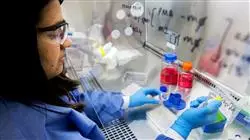University certificate
The world's largest faculty of medicine”
Description
Improve your knowledge in R Programming Language in Genomic Oncology through this program, where you will find the best teaching material with real clinical cases. Learn here about the latest advances in the specialty to be able to perform a quality medical practice"

A fundamental objective of the program is to bring students closer to and disseminate informatics knowledge is already applied in other areas of knowledge, but has a minimal implementation in the medical world, despite the fact that for genomic medicine to become a reality, it is necessary to accurately interpret the huge volume of clinical information currently available and associate it with the biological data generated after a bioinformatics analysis. While this is a difficult challenge, it will allow the effects of genetic variation and potential therapies to be explored quickly, inexpensively and with greater precision than is currently possible.
Humans are not naturally equipped to perceive and interpret genomic sequences, to understand all the mechanisms, pathways and interactions that take place within a living cell, nor to make medical decisions with tens or hundreds of variables. To move forward, a system with superhuman analytical capabilities is required to simplify the work environment and show the relationships and proximities between variables. In genomics and biology, it is now recognized that it is better to spend resources on new computational techniques than on pure data collection, something that is possibly the same in medicine and, of course, oncology.
We have millions of data or publications, but when they are analyzed by physicians or biologists, the conclusions are totally subjective and relative to the available publications or data, which are prioritized arbitrarily. This generates partial knowledge, which is increasingly distanced from the genetic and biological knowledge available and supported by computation, so a giant step in the implementation of precision medicine is to reduce this distance through the massive analysis of available medical and pharmacological information.
Update your knowledge through the program in R Programming Language in Genomic Oncology”
This Postgraduate certificate in R Programming Language in Genomic Oncology contains the most complete and up-to-date scientific program on the market. The most important features include:
- Development of case studies presented by experts in R Programming Language in Genomic Oncology
- Its graphic, schematic and eminently practical contents provide scientific and practical information on those disciplines that are essential for professional practice
- Developments on R Programming Language in Genomic Oncology
- It contains practical exercises where the self-assessment process can be carried out to improve learning
- Special emphasis on innovative methodologies in R Programming Language of Bioinformatics in Genomic Oncology
- All of this will be complemented by theoretical lessons, questions to the expert, debate forums on controversial topics, and individual reflection assignments
- Content that is accessible from any fixed or portable device with an Internet connection
This may be the best investment you can make in the selection of a refresher program for two reasons: in addition to updating your knowledge in R Programming Language in Genomic Oncology, you will obtain a qualification from TECH Global University"
It includes in its teaching staff professionals belonging to the field of R Programming Language in Genomic Oncology, who pour into this program the experience of their work, as well as recognized specialists belonging to reference societies and prestigious universities.
Thanks to its multimedia content elaborated with the latest educational technology, this program will allow the professional a situated and contextual learning, that is to say, a simulated environment that will provide an immersive learning programmed to work in real situations.
This program is designed around Problem-Based Learning, whereby the students must try to solve the different professional practice situations that arise throughout the program. For this purpose, the student will be assisted by an innovative interactive video system developed by recognized experts in the field of R Programming Language in Genomic Oncology with extensive teaching experience.
Increase your decision-making confidence by updating your knowledge through this program"

Take the opportunity to learn about the latest advances in the R Programming Language in Genomic Oncology and improve the care of your patients"
Syllabus
The structure of the contents has been designed by a team of professionals from the best educational centers, universities, and companies in the national territory, aware of the relevance of current specialization in order to intervene in the training and support of students, and committed to quality teaching through New Educational Technologies.

This Postgraduate certificate in R Programming Language in Genomic Oncology contains the most complete and up-to-date scientific program on the market”
Module 1. Data Analysis Processing in Big Data Projects: R Language Programming
1.1. Introduction to R programming language
1.1.1. What is R?
1.1.2. R Installation and the Graphic Interface of R
1.1.3. Packages
1.1.3.1. Standard Packages
1.1.3.2. Contributed Packages and CRAN
1.2. Basic Features of R
1.2.1. The Environment of R
1.2.2. Software and Related Documentation
1.2.3. R and Statistics
1.2.4. R and the Window System
1.2.5. Using R Interactively
1.2.6. An Introductory Session
1.2.7. Obtaining Help with Functions and Features
1.2.8. R Commands, Cap Sensitivity, Etc
1.2.9. Recovery and Correction of Previous Commands
1.2.10. Execute Commands or Diverting the Output to a File
1.2.11. Data Storage and Object Deletion
1.3. Types of Objects in R
1.3.1. Simple Manipulations; Numbers and Vectors
1.3.1.1. Vectors and Their Assignment
1.3.1.2. Vector Arithmetic
1.3.1.3. Generating Regular Sequences
1.3.1.4. Logical Vectors
1.3.1.5. Lost Values
1.3.1.6. Character Vectors
1.3.1.7. Index Vectors
1.3.1.7.1. Selecting and Modifying Subsets of a Dataset
1.3.1.8. Other Types of Objects
1.3.2. Objects, Their Modes and Attributes
1.3.2.1. Intrinsic Attributes: Mode and Length
1.3.2.2. Changing the Length of an Object
1.3.2.3. Obtaining and Configuring Attributes
1.3.2.4. The Class of an Object
1.3.3. Sorted and Unsorted Factors
1.3.3.1. A Specific Example
1.3.3.2. The Tapply () Function and Unequal Matrices
1.3.3.3. Sorted Factors
1.3.4. Matrices
1.3.4.1. Matrices
1.3.4.2. Matrix Indexation. The Subsections of a Matrix
1.3.4.3. Index Matrices
1.3.4.4. The Array () Function
1.3.4.5. Mixed Arithmetic of Vectors and Matrices. The Recycling Rule
1.3.4.6. The Outer Product of Two Matrices
1.3.4.7. The General Transposition of a Matrix
1.3.4.8. Matrix Multiplication
1.3.4.9. Eigenvalues and Eigenvectors
1.3.4.10. Decomposition of Singular Values and Determinants
1.3.4.11. Forming Partitioned Matrices, Cbind () and Rbind ()
1.3.4.12. The Concatenation Function, c (), With Matrices
1.3.5. Factor Frequency Tables
1.3.6. Lists
1.3.6.1. Creating and Modifying Lists
1.3.6.2. Concatenation Lists
1.3.7. Dataframes
1.3.7.1. How to Create Dataframes?
1.3.7.2. Attach () and Separate ()
1.3.7.3. Working With Dataframes
1.4. Reading and Writing Data
1.4.1. The Read.Table () Function
1.4.2. The Scan () Function
1.4.3. Access to the Sets of Incorporated Data
1.4.4. Loading Data from Other R Packages
1.4.5. Editing Data
1.5. Grouping, Loops and Conditional Execution
1.5.1. Grouped Expressions
1.5.2. Control Statements
1.5.2.1. Conditional Execution: If Sentences
1.5.2.2. Repetitive Execution: For Loops, Repetition and Time
1.6. Writing Your Own Functions
1.6.1. Simple Examples
1.6.2. Defining New Binary Operators
1.6.3. Arguments With Name and Default Value
1.6.4. Argument “...”
1.6.5. Assignments Within Functions
Module 2. Statistical Analysis in R
2.1. Discrete Probability Distributions
2.2. Continuous Probability Distributions
2.3. Introduction to Inference and Sampling (Point Estimate)
2.4. Confidence Intervals
2.5. Hypothesis Testing
2.6. ANOVA of a Factor
2.7. Adjustment Bondat (Chi-Square Test)
2.8. Fitdist Package
2.9. Introduction to Multivariant Statistics
Module 3. Graphical Environment in R
3.1. Graphical Procedures
3.1.1. High-Level Plotting Commands
3.1.1.1. The Plot () Function
3.1.1.2. Multivariate Data Visualization
3.1.1.3. Screen Graphics
3.1.1.4. High-Level Plotting Arguments
3.1.2. Low-Level Plotting Commands
3.1.2.1. Mathematical Annotation
3.1.2.2. Hershey Vectorial Sources
3.1.3. Interacting With Graphics
3.1.4. The Use of Graphic Parameters
3.1.4.1. Permanent Changes: The Par () Function
3.1.4.2. Temporal Changes: Arguments to Graphical Functions
3.1.5. List of Graphic Parameters
3.1.5.1. Graphical Elements
3.1.5.2. Axles and Markings
3.1.5.3. Figure Margins
3.1.5.4. Multi-Figure Environment
3.1.6. Descriptive Statistics: Graphical Representations

A unique, key, and decisive training experience to boost your professional development”
Postgraduate Certificate in R Programming Language in Genomic Oncology
The field of medicine is constantly evolving, and Genomic Oncology is a case in point. Doctors have been using blood type information to tailor blood transfusions for over a century, but what has changed is the rapid evolution of genomic data. Today, genomic data can be collected quickly and cheaply from the patient and the community at large, which has led to the emergence of Genomic or Precision Oncology.Genomic Oncology is a personalized approach to cancer treatment that uses genetic information to guide a patient's treatment. This means that the patient's and the tumor's genes are analyzed to determine the best possible treatment. Genomic analysis is a key tool for Genomic Oncology, and the R programming language has become an essential tool for analyzing and managing large amounts of genomic data efficiently.
The latest advances in precision oncology
The Postgraduate Certificate in R Programming Language in Genomic Oncology is the perfect choice for those looking to specialize in the field of precision medicine. In this Postgraduate Certificate, students will learn the fundamentals of R programming and how to apply them to genomic data analysis in oncology. Participants will also learn about genomic data analysis techniques, statistical programming and data visualization.In addition, the Postgraduate Certificate focuses on genomic data analysis in oncology, where concepts such as data exploration, data manipulation, data visualization and statistical modeling are learned. Students will also have the opportunity to work on hands-on projects to apply the knowledge gained in the course.This Postgraduate Certificate is ideal for those seeking a career in Genomic Oncology, as well as healthcare professionals who wish to update their skills and knowledge in genomic data analysis. With the rapid growth of genomic data, there is a great demand for professionals trained in genomic data analysis and programming in R.







